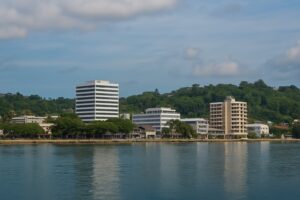Voices from the Pacific: Vanuatu’s PM Calls for Climate Justice and Self-Determination at the UN
At the 79th session of the United Nations General Assembly (UNGA) in New York, Vanuatu’s Prime Minister, Hon. Charlot Salwai Tabimasmas, delivered a compelling address that underscored the imperative of climate justice and the right to self-determination. This article explores the salient points of his speech, examines the broader implications of his remarks, and provides context to the challenges he articulated.
During his address, Prime Minister Salwai eloquently highlighted the existential threats posed by climate change, particularly to small island nations like Vanuatu. His speech resonated deeply, emphasizing the disproportionate effects of climate change on vulnerable countries and the urgent need for global cooperation and responsibility.
Climate Justice: A Global Imperative
Prime Minister Salwai’s address brought to the forefront the immediate and severe impacts of climate change faced by island nations. With rising sea levels, increased frequency of natural disasters, and erratic weather patterns becoming the norm, his call for climate justice was both poignant and timely.
“Climate justice is not just a moral imperative; it is a survival necessity for many of us,” Prime Minister Salwai asserted, urging developed nations to acknowledge their historical emissions and to assist those countries most afflicted.
Advocacy for New Caledonia and West Papua
The Prime Minister’s speech also underscored Vanuatu’s support for the self-determination of New Caledonia and West Papua, aligning with its long-standing policy on decolonization issues. This stance reflects a broader commitment to the principles of sovereignty and the right to self-governance, resonating with the sentiments of other Pacific Island nations.
For New Caledonia, an overseas collectivity of France, the journey towards independence has involved multiple referendums and ongoing dialogue. Vanuatu’s support is significant, reinforcing a common regional perspective on self-determination.
The situation in West Papua, seeking independence from Indonesia, has been contentious and protracted. Vanuatu’s backing is crucial, lending additional international support to West Papua’s aspirations for autonomy.
Global Solidarity and Cooperation
The Prime Minister’s address highlighted the critical need for global solidarity and cooperation. In an era dominated by nationalistic agendas, Vanuatu’s advocacy for collective action on climate change and self-determination exemplifies the importance of international unity.
This spirit of cooperation is particularly pronounced within the Pacific region, where nations frequently collaborate to tackle shared challenges such as climate adaptation, economic development, and regional security. The Pacific Islands Forum serves as a vital platform for these discussions, helping to unify these nations on the global stage.
Key Insights from the Address
- Climate Justice: Urgent calls for developed nations to address their roles in climate change and support vulnerable countries.
- Support for New Caledonia: A reaffirmation of Vanuatu’s support for New Caledonia’s quest for independence.
- Support for West Papua: Continued endorsement of West Papua’s independence movement.
- Global Solidarity: An emphasis on the necessity of international collaboration to tackle global challenges.
- UNGA Platform: Utilization of the UNGA session as a pivotal platform for advocating significant global issues.
Conclusion
Prime Minister Charlot Salwai Tabimasmas’s speech at the UNGA was not merely a presentation but a fervent call for immediate global action on pressing issues such as climate change and self-determination. Vanuatu’s proactive stance in these discussions highlights its role as a leader among small island nations, reminding the world of the critical importance of listening to and supporting these vulnerable countries. As we advance, fostering a unified approach to creating a just, equitable, and sustainable global community is essential.










